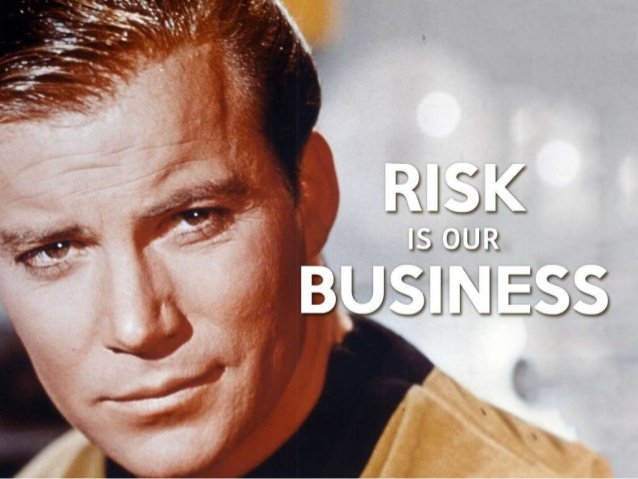As a great philosopher and chewer of scenery, Star Trek’s James T. Kirk once said, “Risk is our business”—nothing great can be accomplished if you’re not willing to take some risks. I like to say, “If failure isn’t an option, then innovation isn’t an opportunity.” However, risk must be managed carefully. In “Return to Tomorrow,” The Original Series episode that this line comes from, the risk is poorly managed, and the impact is nearly catastrophic for all of humanity. What could have been done to prevent the near disaster?
In this episode, the Enterprise comes across the noncorporeal life force of the last three members of a very advanced species. Half a million years earlier, a war destroyed all life on their planet leaving only some sparkling lights in globes in a chamber deep underground. Their leader, Sargon, speaks to the Enterprise crew and explains their history and that all of the humanoid species are descendants of their race (that’s why most of the species on Star Trek look so much like humans, not because their makeup budget was limited). He asks for help in using technology far beyond the Federation’s understanding to create androids, which their life forces can inhabit. In return, he offers humanity access to knowledge centuries more advanced than warp drives and transporters.
To build the androids the three remaining members of Sargon’s race must inhabit humanoid bodies. Sargon inhabits Kirk’s. His wife Thalassa inhabits the body of Dr. Ann Mulhall, a female crew member. Henoch, Sargon’s enemy in the war a million years ago, goes into Spock’s body.
From the beginning, there are signs that this is a very high-risk project. Sargon can control the Enterprise and is very manipulative. He orders Dr. Mulhall to the transporter room and prevents the security detail from beaming down. Their ability to maintain their life force and control the Enterprise speaks to the immense power that Sargon wields; despite the destruction of their world, this makes it clear that Sargon’s race hadn’t overcome its violent tendencies. If Kirk had done a failure mode and effects analysis, he would have seen a lot of incredible, high-severity risks (e.g., Sargon, Thalassa, and Henoch create their androids to freely travel across the galaxy, using their superior capabilities to enslave humanity). Just as worrisome, he has no knowledge of the probability of these risks.
In Kirk’s speech, he talked about the Apollo Space Missions and other achievements, but these were undertaken very methodically. First, NASA launched Project Mercury and then Gemini, learning lessons that were applied to Project Apollo. There were also setbacks, like the fire the killed the crew of Apollo 1. At no point was the subjugation of humanity at risk. Kirk is so focused on the upside that he is unable to weigh the pros and cons.
What might have Kirk and company done instead? Maybe have Sargon teach the crew of the Enterprise how to build the androids. This would have taken longer, but after waiting 500,000 years, what’s another 10 or 20? During that period, humanity would have gotten to understand the risks better and would have been able to decide whether moving forward was prudent. It’s possible Sargon wouldn’t have accepted that deal and destroyed the Enterprise, but if that’s the kind of being Sargon is, then anything that prevents his scheme to conquer the galaxy is probably a worthwhile cost.
Kirk accurately described this as a risky project, and yet he puts no effort in creating mitigations in case these risks come to pass. It’s like he’s doing trapeze for the first time without setting up a net. They didn’t even discuss what the worst-case scenarios were and what to do if they came to pass. You should never undertake a risky project without having a plan for what to do if things go wrong.
In this case, Kirk’s risk-loving nature leads to near disaster. Henoch wants to keep Spock’s body but knows that Sargon won’t allow it, so Henoch manipulates Nurse Chapel’s mind and has her give Sargon/Kirk ineffective medicine that is slowly killing them. Luckily, Sargon is one step ahead of Henoch and foils his plan. Sargon also realizes that their attempt to return to the living was folly, and his and Thalassa’s spirits leave their human hosts, drifting to oblivion forever. However, if Henoch hadn’t underestimated Sargon, it’s likely he would have taken over the Enterprise and used it as a platform to conquer the known universe. That’s a pretty bad outcome to rely on a single point of failure.
If risk is your business, then I hope you do it more thoughtfully than Kirk.







